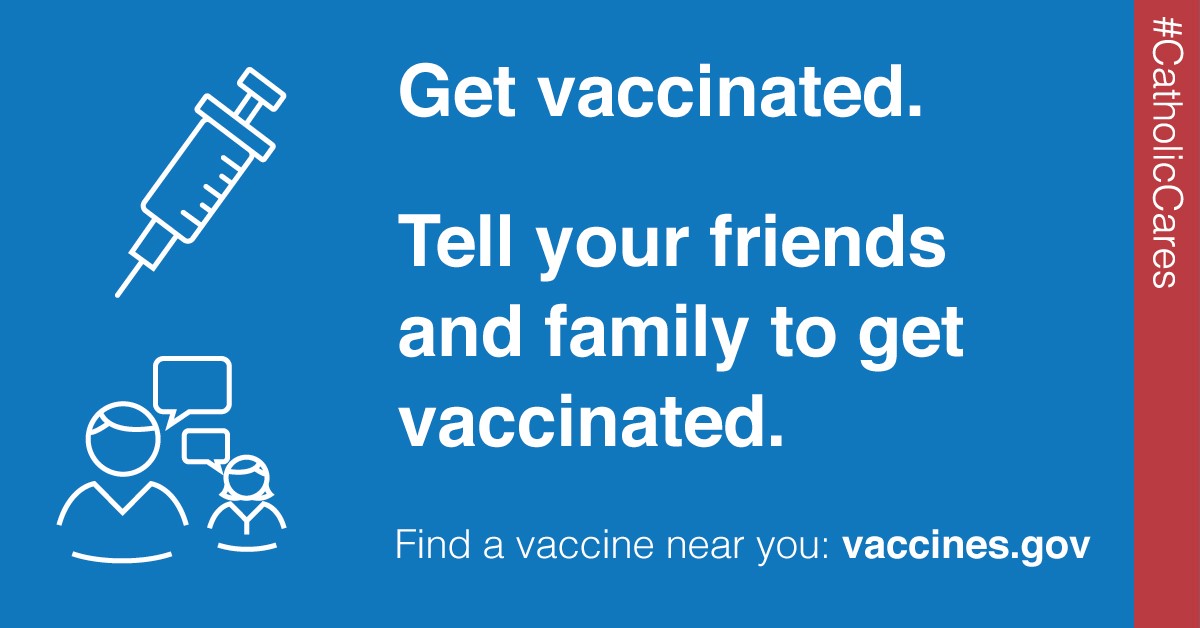Conscience and Vaccine Acceptance
Dr. Don McCrabb, chair of the Catholic Cares Coalition and executive director of the U.S. Catholic Mission Association, wrote the following article on conscience and the Church’s encouragement of COVID-19 vaccines.
Dr. Don McCrabb, chair of the Catholic Cares Coalition and executive director of the U.S. Catholic Mission Association, wrote the following article on conscience and the Church’s encouragement of COVID-19 vaccines. This article was published in the September-October 2021 issue of NewsNotes.
According to the Catechism of the Catholic Church, “conscience is a judgement of reason whereby the human person recognizes the moral quality of a concrete act that he (or she) is going to perform, is in the process of performing, or has already completed.” (CCC 1778).
When faced with accepting the vaccine, a person must decide if the vaccine is good or bad. It may seem silly, but it is good to step back and consider how we make moral decisions. Get the facts, weigh the benefits and the risks, pray, decide, and act.
COVID-19 is a virus that causes people to get sick and even die. The World Health Organization declared it a pandemic – meaning that this virus is spreading all over the world and it is difficult to contain. As Catholics, we are concerned about the health and well-being of ourselves, our families, and our neighbors. We are concerned, too, about the health and well-being of everyone in the world.
Perhaps a dose of humility here. Our health care professionals did not know a lot about COVID-19 when it first showed up in the US late 2019 and early 2020. They have learned a lot since then but there is still a lot they do not know. For example, most people recover from COVID-19. Nevertheless, some people who have recovered from COVID-19 are now suffering from other medical conditions. Nevertheless, according to Statista, 517,575 people have died of COVID-19 in the United States as of March 17, 2021. Fifty-three percent of those people are 65 or older.
There are now three vaccines available in the United States and more are on the way. The vaccine, according to our health care professionals, is the best way to avoid getting the virus. Pope Francis, and the US Conference of Catholic Bishops, has stressed the value of getting the vaccine – both for our own good and the good of others.
Still, we hear of friends and family members who are hesitant to get the vaccine. Still others resist the vaccine and there are even some who are hostile to the vaccine. It seems like every hour there is a new story in the news or on social media.
The challenge today – even with so much information so quickly available over the internet – is to distinguish facts from opinion. Do you know the source of the information? Is it a trustworthy source? Is the information provided confirmed by other trustworthy sources?
One of the controversies with the vaccines is the use of cell lines scientists created last century from the remains of an aborted baby. Pope Francis, and the US Bishops, have taken this reality into consideration. The Ethics and Public Policy Center pulled together “pro-life” Catholic scholars that have affirmed that it is morally acceptable to receive the COVID-19 vaccines. You can read their statement for yourself – it is only three pages long and very informative.
You also need to know yourself. Perhaps you have a medical condition that may make the vaccine – which is good for most people – bad for you. It is always best to consult with your doctor if you are not sure. Of course, there is more to you than your own medical history. Have you developed a bias against the vaccine? Do you mistrust the medical experts because people you are close speak poorly of them, or political or religious leaders you follow have spoken against them?
The work of conscience is to examine the facts for yourself. The vaccines have become a political issue and we need to see through partisan posturing and make a moral decision before God and God alone.
Saint John Henry Newman said, “Conscience is the aboriginal Vicar of Christ.” It is our responsibility to gather the relevant information and to make an act of conscience. We may still have questions, and we may not be absolutely sure – because we just do not have all the facts – but we must make a decision and be confident that we have added up moral issues to the best of our ability.
Need a refresher on conscience formation? Consider this video done by Catholic Central for a youth and young adult audience. The bishops also have an article on conscience that you may find helpful. The discussion on conscience can be found in the Catechism of the Catholic Church (1776-1802).
At the end of the day, you decide. A moral decision is a decision we make before God, for our good and the good of others.

